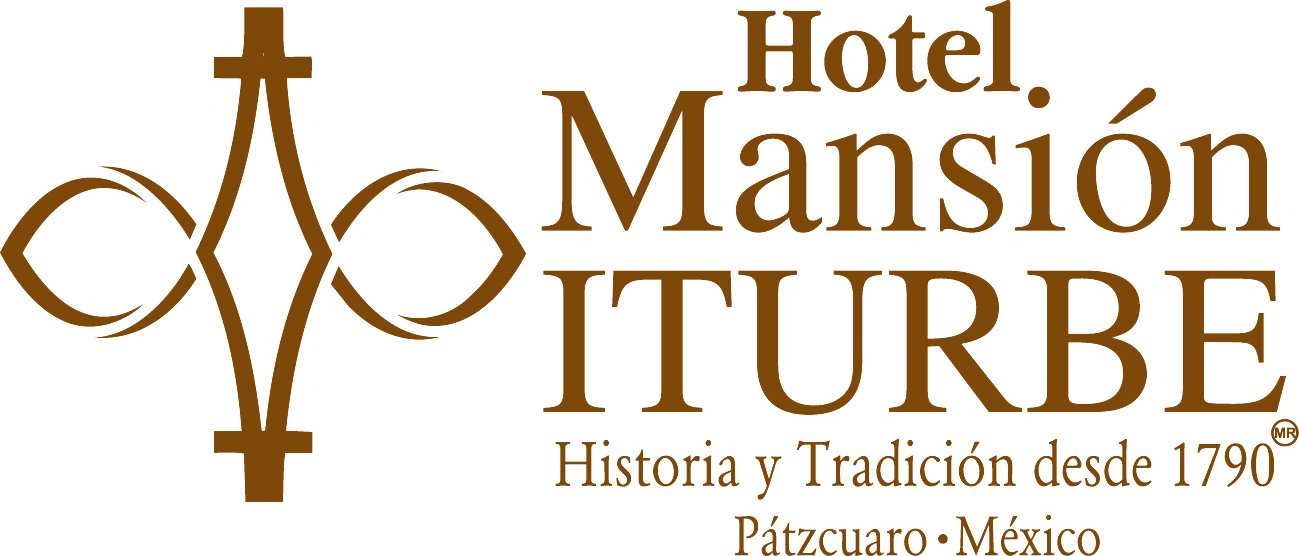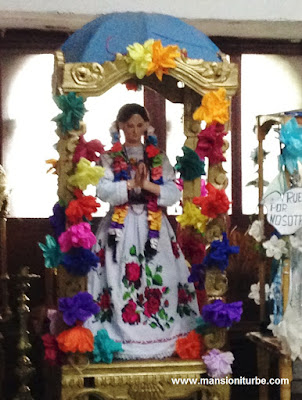Religious Figures of Corn Pulp
Religious
figures of corn pulp are an important legacy of the Pátzcuaro Lake region indigenous people (Purépechas), partly
because this technique, which was developed by the prehispanic Purépechas, was unique in the entire world. Museums around the world prize these
figures among their collections.
For our guests
at Hotel Mansion Iturbe who love art
and culture, visiting our temples where these extraordinary religious sculptures are located is a
memorable experience.
 |
| Señor de la Tercera Orden in Pátzcuaro during the Easter Season |
These figures were created during the 16th, 17th, and 18th centuries, mainly in Pátzcuaro and Tzintzuntzan.
The Spanish
evangelists were fascinated by this unknown technique and many of the figures
were taken back to Spain, where they were widely recognized for their level of
detail, as well as the astonishing lightness of the material.
 |
| Religious Figure of Corn Purp in Tocuaro, Michoacán |
There was an
artistic and religious union between the two worlds, whereby the indigenous
technique was applied to create religious sculptures that were used for the
very evangelization of the indigenous.
Among the corn
pulp Christs that were brought to Spain during this period, we find the
Santísimo Cristo de la Sangre Torrijos in Toledo, and religious sculptures of
corn pulp in the chapels of the Monasterio
de las Descalzas Reales in Madrid, which form part of the Spanish
historical heritage.
In Michoacán, we
find the famous Virgen de la Salud inthe Basilica in Pátzcuaro, El Señor de la Sacristía in the Cathedral in Morelia, El Señor de Araró, El Señor de
los Milagros, which was originally in San Juan Parangaricutiro near the Paricutín volcano, but was moved to San
Juan Nuevo during the eruption of the volcano.
 |
| Our Lady of Health at the Basilica in Pátzcuaro |
If you like Mexican colonial art, visit Pátzcuaro, visit the communities of the
Lake Region and appreciate the
different religious sculptures that are located in their temples.
Jarácuaro has a fine collection in its temple.
 |
| Religious Figures of Corn Pulp in Jaracuaro |
In Tzintzuntzan, due to its importance in
the elaboration of sculptures of corn pulp in colonial times, they have a
"Cemetery of Christs," where fragments of corn pulp Christs from the
colonial era are proudly guarded by the inhabitants. During your visit to this Pueblo
Mágico, be sure to visit the Ex Convento Franciscano de Santa Ana, considered a jewel of colonial architecture in
Mexico.
The Museo de Arte Colonial in Morelia has
an outstanding collection of Christs of corn pulp. There you will find
around 100 religious sculptures of this material, as well as other artifacts
from the colonial period.
 |
| Religious Figures of Corn Pulp made by Michoacan Artists |
We can find
other such figures made in and around Pátzcuaro
in other areas of the country. Jalisco: La Virgen de Zapopan and La Virgen de
San Juan de los Lagos. Guadalajara: El Señor de las Aguas in the
Cathedral. Tuxpan: El Señor del Perdón.
In the Cathedral in Mexico
City, we find El Señor del Veneno y el Señor del Cacao.
In Pátzcuaro, in La Casa de Los Once
Patios, visit the workshop of Mario Agustin Gaspar and his spouse Beatriz
Ortega. These Michoacán artisans still work with this
technique. Their works have found their way into some pretty exclusive venues,
including the Vatican, with a Nacimiento Monumental which was given to the Pope
Benedict XVI during the Mexican Christmas at the Vatican in 2012.
 |
| Our Lady of Health of Pátzcuaro made of Corn Pulp |
In Tupátaro, visit the Templo de Santiago Apóstol, with its own collection of corn pulp figures. You can also visit the Taller de Rescate de la Técnica y Oficio de la Pasta de Caña. The docent is always glad to provide more information.
 |
| Temple of Santiago Apostol in Tupataro, Michoacan |
Expand your knowledge of Mexican colonial art and
discover this important contribution of the Purépecha culture to religious art in Mexico. Design your tour from
Hotel Mansión Iturbe with the
support of experts and enjoy an enriching and unforgettable experience.
*Text and pictures property of Hotel Mansión Iturbe.
We invite you to visit our blog, you will find information about Pátzcuaro and its surroundings that we hope will be useful for your next trip to our colonial town in Mexico.
Here are some post that we suggest you:
Visit the Recently Remodeled National Copper Museum
Hotel Mansión
Iturbe
Portal Morelos
59
Plaza Vasco de
Quiroga
61600 Pátzcuaro, Mich.
México
For more information about our Hotel in
Patzcuaro
Reservations online at Hotel Mansion Iturbe
Tels: +52 (434) 342 0368 / 342 3628
Fax: +52 (434) 342 3627
Toll Free fax number from USA & CANADA: 1 866 678 6102
61600 Pátzcuaro, Mich.
México
Reservations online at Hotel Mansion Iturbe
Tels: +52 (434) 342 0368 / 342 3628
Fax: +52 (434) 342 3627
Toll Free fax number from USA & CANADA: 1 866 678 6102
GDS
CODES:
Sabre: ON 16297










Comentarios